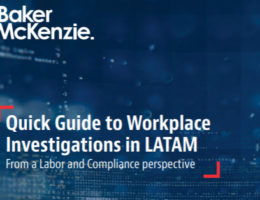On 24 November 2022, Decree No. 67,301/2022 was published by the government of the state of São Paulo and provided for the administrative liability of legal entities for the practice of acts against the public administration in the city. The decree, which came into effect on the date of its publication, establishes the competence to judge administrative infractions and sets the jurisdictional authority to initiate an Administrative Liability Proceeding and the procedural norms for its execution.
We invite you to join us as members of our Latin American Dispute Resolution practice take a closer look at the new political scenarios unfolding in several countries, and at the future of investment disputes in the region. Our team will share insights on the possibility of corporate restructuring under existing legislation, and strategies for litigation preparation to help your organization be ready for the times ahead.
In this edition of the anti-bribery and anti-corruption review, you will find an incisive overview of the legal and regulatory frameworks established to combat white-collar crime in major jurisdictions. With a focus on the practical implications of recent enforcement trends and policies, our lawyers examine key issues such as domestic and foreign bribery, associated offenses including money laundering, and best practices for internal compliance programs.
Mainly during the pandemic, the use of technological resources for performing a job has significantly grown. As a result, the access to such resources in the context of internal investigations has become almost a must. This triggers relevant concerns from a data privacy and a labor perspective.
On 1 June 2021, the President sanctioned Complementary Law 182/2021 (“Legal Framework for Startups”). The main goal of the new law is to promote and encourage innovative entrepreneurship in the country, focusing on the growth of startups as a path to economic, social, and environmental development; and the modernization of the Brazilian business environment.
The MAPA Integrity Recognition (“Selo Mais Integridade”) was created on 12 December 2018 by MAPA Ordinance No. 2462 to recognize and reward agribusiness companies for their integrity practices — particularly in terms of social responsibility, sustainability and ethics — in addition to validating their efforts to mitigate fraud, bribery and corruption. For 2021, agribusiness companies and cooperatives seeking recognition for these practices and for their commitment to prevent fraud and corruption have until 21 June to register for the Selo Mais Integridade 2021 to 2022.
On 1 April 2021, Law nº 14,133/2021 or the New Public Procurement General Law (“New Public Procurement Law”) was published, substituting Law nº 8,666/1993. The Brazilian president, however, has vetoed 26 items of the bill approved by the National Congress.
Through Directive Release No. 2/2021/CVM/SIN, CVM issued guidelines on the minimum elements that must compose the compliance activities and the compliance report provided for in Articles 19 to 22 of CVM Instruction No. 558 (ICVM). The purpose of the document is to present to securities portfolio managers registered with CVM the topics that must be observed by the compliance area and, consequently, appear in the compliance report, as well as the corresponding tests that must be included. It is important to remember that, if the compliance area does not act independently or does not carry out its activities as required by ICVM 558, the institution may suffer sanctions, ranging from the issuance of an alert letter to, at the maximum, termination of society as a securities portfolio manager. The report regarding compliance activities in 2020, which must be prepared by April 2021, should observe the guidelines described in this directive release.
The Brazilian Senate approved last week the final text of the bill for a new public procurement general law (“New Public Procurement Law”), which will substitute Law nº 8,666/1993. The final document will now be submitted to the Brazilian president for signature and/or vetoes.
In brief The Advocacy and Competition Law Secretariat of the Ministry of Economy (SEAE) published last Wednesday Public Consultation no. 02/2021, through which it seeks to receive contributions regarding potential abusive or excessive actions by federal regulators. The contributions will be used by the SEAE to develop a public policy…







